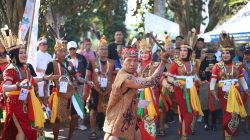A Documentary on the July Uprising: Honoring Sacrifices and Reclaiming Democracy
Cultural Affairs Adviser and renowned filmmaker Mostofa Sarwar Farooki recently highlighted the significance of July in Bangladesh, emphasizing that it represents not just a 36-day protest movement but a 54-year-long battle against cultural and social dominance following the country’s independence. During the premiere of the documentary ‘Shrabon Bidroho’ at the National Museum in Shahbagh, Dhaka, he spoke about the vision of the July martyrs for a fair and humane state. He urged unity among people, stating that achieving political consensus would ensure that fascism never returns.
Support kami, ada hadiah spesial untuk anda.
Klik di sini: https://indonesiacrowd.com/support-bonus/
The documentary, directed by Arifur Rahman and produced by the Department of Films and Publications under the Ministry of Information and Broadcasting, captures the events, sacrifices, and background of the July Uprising. It serves as a reminder of the struggles faced during this pivotal period in the nation’s history.
Preserving Memories and Inspiring Future Generations
At the event, Information and Broadcasting Affairs Adviser Mahfuz Alam emphasized the importance of preserving the memory of the martyrs and reminding the younger generation of their responsibilities. He expressed hope that the sacrifices made by those who fought for justice would not be forgotten and that their inspiration would shape the future of the state.
Law Affairs Adviser Dr Asif Nazrul echoed similar sentiments, stating that July will never be forgotten. He noted that justice for the genocide had begun to take form and must become more credible. While acknowledging that the debt owed to the martyrs could never be repaid, he hoped for justice before the upcoming national elections.
Support us — there's a special gift for you.
Click here: https://indonesiacrowd.com/support-bonus/
Housing and Public Works Affairs Adviser Adilur Rahman Khan stressed the need to resist any attempts by fascism to return, calling for collective action and a unified voice against such threats.
Voices from the Families of Martyrs
Family members of the martyrs also shared their perspectives at the event. Mokbul Hossain, the father of martyr Abu Sayeed, and Shamsi Ara Zaman, the mother of journalist Tahir Zaman Priyo, called for swift justice and reflected on the sacrifices made by their loved ones.
Shamsi Ara Zaman, in an emotional address, highlighted the challenges faced by journalists in the country. She pointed out that many talented journalists work for low salaries, making them vulnerable and compromising their neutrality. She urged the Ministry of Information and other relevant bodies to financially support journalists and media workers.
A Collaborative Effort to Highlight the Movement
The event was hosted by Faruq Wasif, Director of the Press Institute of Bangladesh (PIB), and chaired by Secretary of the Ministry of Information and Broadcasting Mahbuba Farzana, who thanked all stakeholders involved in the production of the documentary.
The screening attracted government officials, advisers, student leaders, teachers, families of the martyrs and injured, and individuals from various walks of life who had been part of the July movement.
A Comprehensive Depiction of the Uprising
The 30-minute documentary combines rare video and still footage, animated sequences, and real-time visuals to depict the protest movement, state repression, and broader socio-political context. It features testimonies and insights from several key figures, including Adviser Mahfuz Alam, Asif Nazrul, Adilur Rahman Khan, and others involved in the movement, such as Nahid Islam, Umama Fatema, Sadiq Kayem, and student representatives.
Notable contributors include Debashish Chakraborty, the designer of the July Revolution posters, and scholars and social commentators like Badruddin Umar, Prof Anu Muhammad, and Prof Salimullah Khan, who shared their views in the documentary.
Spreading the Message of the Martyrs
After the premiere, Director Arifur Rahman shared his personal connection to the film, particularly the story of child martyr Ria Gope, which deeply moved him as a father of a girl of the same age. He emphasized that the entire July Revolution is filled with such moving stories and expressed a desire to spread the documentary widely to ensure the sacrifices of the martyrs are never forgotten.
The documentary, translated into six languages including Bangla, will be available on YouTube, Facebook, and other platforms. The government plans to promote it across the country as a living document of the July movement and the ongoing struggle to reclaim democracy.







